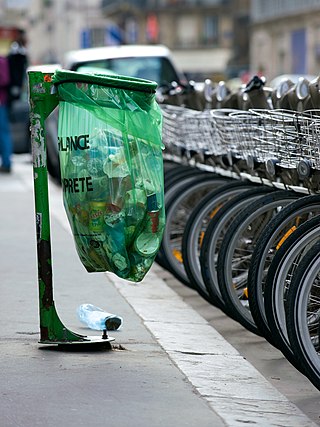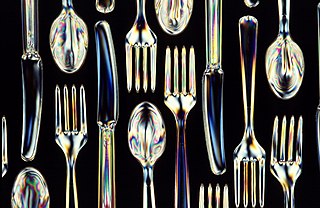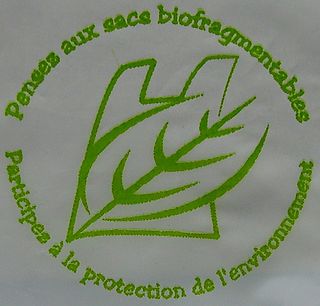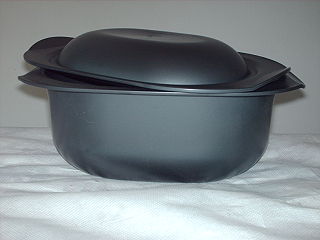
Biodegradation is the breakdown of organic matter by microorganisms, such as bacteria and fungi. It is generally assumed to be a natural process, which differentiates it from composting. Composting is a human-driven process in which biodegradation occurs under a specific set of circumstances.

A tea bag or teabag is a small, porous, sealed bag or packet, typically containing tea leaves or the leaves of other herbs, which is immersed in water to steep and make an infusion. Originally used only for tea, they are now made with other tisanes as well.

A drinking straw is a utensil that is intended to carry the contents of a beverage to one's mouth. Disposable straws are commonly made from plastics. However, environmental concerns related to plastic pollution and new regulation have led to rise in reusable and biodegradable straws. Following a rise in regulation and public concern, some companies have even voluntarily banned or reduced the number of plastic straws used. Alternative straws are often made of reusable materials like silicone or metal or alternative disposable and biodegradable materials like paper, cardboard, pasta, or bamboo.

Plastic shopping bags, carrier bags, or plastic grocery bags are a type of plastic bag used as shopping bags and made from various kinds of plastic. In use by consumers worldwide since the 1960s, these bags are sometimes called single-use bags, referring to carrying items from a store to a home. However, it is rare for bags to be worn out after single use and in the past some retailers incentivised customers to reuse 'single use' bags by offering loyalty points to those doing so. Even after they are no longer used for shopping, reuse for storage or trash is common, and modern plastic shopping bags are increasingly recyclable or compostable. In recent decades, numerous countries have introduced legislation restricting the provision of plastic bags, in a bid to reduce littering and plastic pollution.

A plastic bag, poly bag, or pouch is a type of container made of thin, flexible, plastic film, nonwoven fabric, or plastic textile. Plastic bags are used for containing and transporting goods such as foods, produce, powders, ice, magazines, chemicals, and waste. It is a common form of packaging.

A bin bag, rubbish bag, garbage bag, bin liner, trash bag or refuse sack is a disposable bag used to contain solid waste. Many bags are useful to line the insides of waste containers to prevent the insides of the receptacle from becoming coated in waste material. Most bags today are made out of plastic, and are typically black, white, or green in color.

Bioplastics are plastic materials produced from renewable biomass sources, such as vegetable fats and oils, corn starch, straw, woodchips, sawdust, recycled food waste, etc. Some bioplastics are obtained by processing directly from natural biopolymers including polysaccharides and proteins, while others are chemically synthesised from sugar derivatives and lipids from either plants or animals, or biologically generated by fermentation of sugars or lipids. In contrast, common plastics, such as fossil-fuel plastics are derived from petroleum or natural gas.
Polyethylene or polythene film biodegrades naturally, albeit over a long period of time. Methods are available to make it more degradable under certain conditions of sunlight, moisture, oxygen, and composting and enhancement of biodegradation by reducing the hydrophobic polymer and increasing hydrophilic properties.

Biodegradable waste includes any organic matter in waste which can be broken down into carbon dioxide, water, methane, compost, humus, and simple organic molecules by micro-organisms and other living things by composting, aerobic digestion, anaerobic digestion or similar processes. It mainly includes kitchen waste, ash, soil, dung and other plant matter. In waste management, it also includes some inorganic materials which can be decomposed by bacteria. Such materials include gypsum and its products such as plasterboard and other simple sulfates which can be decomposed by sulfate reducing bacteria to yield hydrogen sulfide in anaerobic land-fill conditions.

Biodegradable plastics are plastics that can be decomposed by the action of living organisms, usually microbes, into water, carbon dioxide, and biomass. Biodegradable plastics are commonly produced with renewable raw materials, micro-organisms, petrochemicals, or combinations of all three.

Waste sorting is the process by which waste is separated into different elements. Waste sorting can occur manually at the household and collected through curbside collection schemes, or automatically separated in materials recovery facilities or mechanical biological treatment systems. Hand sorting was the first method used in the history of waste sorting. Waste can also be sorted in a civic amenity site.

Sustainable packaging is the development and use of packaging which results in improved sustainability. This involves increased use of life cycle inventory (LCI) and life cycle assessment (LCA) to help guide the use of packaging which reduces the environmental impact and ecological footprint. It includes a look at the whole of the supply chain: from basic function, to marketing, and then through to end of life (LCA) and rebirth. Additionally, an eco-cost to value ratio can be useful The goals are to improve the long term viability and quality of life for humans and the longevity of natural ecosystems. Sustainable packaging must meet the functional and economic needs of the present without compromising the ability of future generations to meet their own needs. Sustainability is not necessarily an end state but is a continuing process of improvement.

Disposable food packaging comprises disposable products often found in fast-food restaurants, take-out restaurants and catering establishments. Typical products are foam food containers, plates, bowls, cups, utensils, doilies and tray papers. These products can be made from a number of materials including plastics, paper, bioresins, wood and bamboo.

Biodegradable bags are bags that are capable of being decomposed by bacteria or other living organisms.

Plastics are a wide range of synthetic or semi-synthetic materials that use polymers as a main ingredient. Their plasticity makes it possible for plastics to be moulded, extruded or pressed into solid objects of various shapes. This adaptability, plus a wide range of other properties, such as being lightweight, durable, flexible, and inexpensive to produce, has led to its widespread use. Plastics typically are made through human industrial systems. Most modern plastics are derived from fossil fuel-based chemicals like natural gas or petroleum; however, recent industrial methods use variants made from renewable materials, such as corn or cotton derivatives.

Plastic pollution is the accumulation of plastic objects and particles in the Earth's environment that adversely affects humans, wildlife and their habitat. Plastics that act as pollutants are categorized by size into micro-, meso-, or macro debris. Plastics are inexpensive and durable, making them very adaptable for different uses; as a result, manufacturers choose to use plastic over other materials. However, the chemical structure of most plastics renders them resistant to many natural processes of degradation and as a result they are slow to degrade. Together, these two factors allow large volumes of plastic to enter the environment as mismanaged waste which persists in the ecosystem and travels throughout food webs.

Plastic containers are containers made exclusively or partially of plastic. Plastic containers are ubiquitous either as single-use or reuseable/durable plastic cups, plastic bottles, plastic bags, foam food containers, Tupperware, plastic tubes, clamshells, cosmetic containers, up to intermediate bulk containers and various types of containers made of corrugated plastic. The entire packaging industry heavily depends on plastic containers or containers with some plastic content, besides paperboard and other materials. Food storage nowadays relies mainly on plastic food storage containers.
Mubarak Ahmad Khan is a Bangladeshi scientist who has been doing research into jute's commercial uses and possibilities. According to the science-based research database, Scopus, he is considered to be the leading scientist in the study of jute worldwide. He is currently serving as the Scientific Advisor of Bangladesh Jute Mills corporation (BJMC). Among his inventions are the Sonali Bag, Jutin, and helmets and tiles made from jute.

Polymateria Ltd is a British technology company developing biodegradable plastic alternatives. In 2020, the privately owned company was the first to achieve certified biodegradation of the most commonly-littered forms of plastic packaging in real-world conditions, in less than a year without creating microplastics.
France's anti-waste law for a circular economy was passed in an effort to eliminate improper disposal of waste as well as limit excessive waste. This law is part of Europe's larger environmental activism efforts and builds on previous laws the country has passed.
















